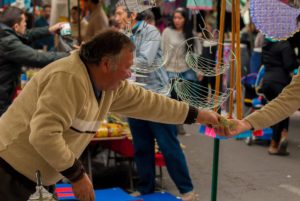Blog
Bank Balances and Better Bureaucracy: Transitioning the informal economy in the developing world
Written by Cameron Pickett
December 12, 2017
The developing world struggles with many institutional barriers to formal business start-ups. In some countries, top heavy, overly bureaucratic and inefficient procedures are required before starting a formal business, and sometimes can take weeks, months or even years to complete.
These cumbersome systems have two immediate effects. First, they breed corruption. In many countries, the business formation process can be made exponentially faster and easier if you know whose pockets to fill. Second, and perhaps more directly relevant to economic growth, is that it swells the informal sector. The International Labour Organization estimates that “the informal economy comprises half to three-quarters of all non-agricultural employment in developing countries.” You’ll find that across the developing world, there is an extraordinary amount of commerce that takes place at road intersections, on sidewalks and in vast markets. Unfortunately, there is little evidence that large informal sectors have longterm economic development potential.
How to approach the informal sector, within an economic development context, lacks agreement among economists and development specialists. On one side of the argument, large informal markets are vital for supporting the welfare of millions across the world. The other side of the debate argues that governments are missing out on large pools of tax revenue which cannot be easily extracted from people in the informal market. Moreover, attempts to tax merchants selling bags of water, or any other good in the informal market, can take the small amount of resources away from people who rely on an incredibly unreliable and non-lucrative occupation to survive. Building a system where tax collectors patrol the streets, approaching individual merchants, would not only be extremely difficult, due to many individuals often lacking formal addresses or documentation, but also could beget corruption itself.

Developing countries, especially those with large rural populations, often have a serious lack of recordkeeping for things as essential as formal addresses and birth certificates. Related to this lack of identification is a chronic lack of private and commercial banking in many countries, often because of the difficulty of verification. If banks are able to provide credit, they are often reluctant to, due to the perceived risk of borrowers. Individuals are often reluctant to borrow due to high interest rates or lack of trust. Instead, the informal market relies on systems of credit that require less oversight. For example, a merchant might loan an individual his or her first 500 bags of water without charging an initial payment. In return, the individual will continue to rely on the merchant for supply while paying interest earned from the individual’s sales. This system requires no bank accounts and can happen outside of formal balance sheets. Formal businesses however, need formal bank accounts, and formal bank accounts are essential if governments are serious about raising fair tax revenue from businesses and individuals.
The informal sector in the developing world has found innovative ways simplifying commerce. Take the mobile banking revolution that has taken place in sub-Saharan Africa in the last few decades. Today, individuals can make payments, receive their wages and even receive loans through their mobile devices at a very low cost. Despite the ease the technology has brought, there is no obvious or easy way governments can take advantage of the money held in mobile accounts associated with little more than a sim card. While these accounts reduce transaction costs, they are by no means a substitute for a formal, interest earning, bank accounts.
In spite of the efficiency these technologies and commercial relations bring, there is not much historical evidence that large informal markets are capable of dramatically developing an economy. That said, there may be lessons to be learned from the informal sector about trust and commercial relations.

The essential question remains, how do governments mobilize the productive capacity of their informal markets? How can governments extract the surplus value of all of the commerce that happens in the common places in developing countries so that they may invest it into services and programs to further develop their economies?
Some economists are developing new innovative strategies to change the character of bureaucracy in order that incentivize individuals to register formal businesses. Ideas like transitioning to online registration for things like birth certificates and business licences, improving the salaries of bureaucrats and increasing oversight might simplify the process and weed out corruption. Even given these sorts of reforms, there are many hurdles to address. For one, overhauling an entire bureaucratic system imposes immense difficulties, not least of which are the number of powerful interests who have been made wealthy from their positions in the system.
Financial institutions have had difficulties embracing private banking in the developing world, but new financial services like zero-risk, prize-linked savings accounts may change that. Innovations like microfinance have been successful in funding small commercial projects but have had an ambiguous effect on savings account creation.
If countries are serious about sparking economic growth, they should also be active in reforming their bureaucracies, promoting policies that allow larger proportions of the unbanked populous into the formal banking sector. The transition from informal to formal economies does not happen overnight and is certainly not easy. Furthermore there is still no formula that will work in every case, but embarking on programs that will achieve these goals could encourage foreign investment and make domestic firms and labour more competitive in the world market.
Cameron Pickett was an intern at LIDC in November- December 2017.

